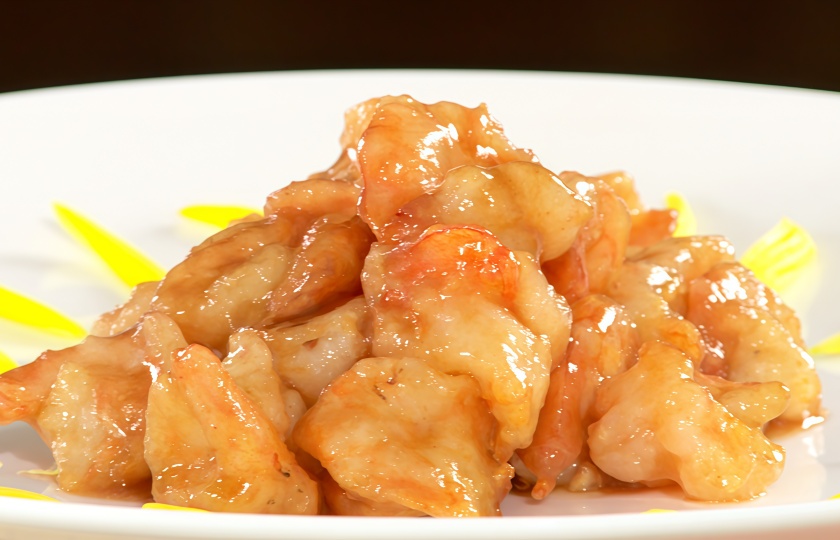Crispy Shrimp with Sweet and Sour Sauce


With its crispy coating, juicy shrimp, and perfectly balanced sweet and sour sauce, this dish creates lasting memories. Let's uncover the cooking secrets behind this delightful creation.
Why do I love this recipe?
The sweet and sour flavor is never tiresome: The proportion of the sweet and sour sauce is just right. The balance between white sugar and black vinegar is perfect, neither overly sweet to make you feel sick nor overly sour to make you frown.
Smart handling of the shrimp: Slitting the shrimp not only makes them more flavorful but also causes them to curl into beautiful balls when fried.
Quick operation and no messy hands: It can be done in 20 minutes from marinating the shrimp to serving, and only one pot needs to be washed throughout the process.
Highly flexible: I've tried replacing the shrimp with chicken breast chunks, and they still taste great after being coated with starch and fried.

Required ingredients and substitutions
Shrimp: Either fresh or frozen shrimp will do, but make sure to slit and devein them. You can also replace them with small pieces of basa fish or chicken breast. Just extend the frying time by 1 minute.
Cornstarch slurry: Cornstarch or potato starch works the same way. Sweet potato starch will be stickier. If you don't have any starch on hand, you can use egg white with a little flour instead, but the crust won't be as crispy.
White sugar: Brown sugar will make the color darker. If using honey, halve the amount and drizzle it at the end. People who need to control their sugar intake can use zero - calorie sweeteners, but add two drops of lemon juice to balance the sweetness.
Black vinegar: Xiang vinegar is milder, and apple cider vinegar has a fruity aroma. If using white vinegar, halve the amount to avoid it being too sour. If you like a fruity aroma, you can squeeze half an orange's juice to replace it.
Scallion - ginger juice: Freshly squeezed scallion - ginger juice has the best flavor. For a lazy option, you can use ginger powder + minced garlic (in a 1:2 ratio). People sensitive to ginger can replace it with onion juice and add a little white pepper powder to enhance the aroma.
Frying oil: Peanut oil makes the food the most fragrant when frying, but coconut oil has a special aroma. If you prefer a lighter taste, you can use rice bran oil or sunflower oil. Don't use butter as it easily burns.
How to select shrimp?
Key points for selecting fresh shrimp:
The shrimp shells should be semi - transparent with a bluish - gray luster. The surface feels moist but not sticky when touched. The connection between the shrimp head and body is tight and won't separate easily when gently pulled. When pressing the shrimp meat, it can bounce back quickly without feeling soft and floppy.
Precautions for selecting frozen shrimp:
Choose packages with a thin and evenly distributed ice coat. You should be able to clearly see the texture of the shrimp body through the ice layer. After thawing, the shrimp body naturally curves into a C - shape. If it is straight and stiff, it may have been frozen and thawed repeatedly. It should only have a faint sea - water smell. Avoid shrimp with a pungent chemical smell.
For this recipe, it is recommended to use medium - sized shrimp that are 15 - 20 centimeters long. If the shrimp are too small, they are likely to become dried out during frying. If they are too large, they are not easy to absorb the flavor. Black tiger shrimp have firm meat and can withstand frying. White - leg shrimp are sweet, but they shrink significantly after frying.
INGREDIENTS
Main Ingredients
-
·150g shrimp (needs to be slit open)
Seasonings
-
·3g salt
-
·20g white sugar
-
·20ml cooking wine
-
·10ml black vinegar
-
·10ml scallion - ginger juice
-
·10ml cornstarch slurry
-
·Appropriate amount of cooking oil (for frying shrimp)
COOKING STEP
Step 1
Slit open 150g of shrimp, pour in 50ml of cornstarch slurry, and mix well.

Step 2
Prepare a bowl, add 3g of salt, 20g of white sugar, 20ml of cooking wine, 10ml of black vinegar, 10ml of scallion - ginger juice and 10ml of cornstarch slurry, and mix well to make the sauce.

Step 3
Heat oil in a pan, put in the coated shrimp, and fry until golden, then remove them from the pan.

Step 4
Leave some oil in the pan, put in the fried shrimp and the prepared sauce.

Step 5
Stir - fry until the sauce thickens, then remove from the pan and serve on a plate.

More recipes worth trying
Dragon Well Tea Shrimp(Long Jing Xia Ren)
Delicious Braised Prawns Recipe
Exquisite Steamed Shrimp with Vermicelli Recipe
Recipe Tips
Key points for pre - treating shrimp: After slitting the shrimp, soak them in ice water for 10 minutes. This can make the shrimp meat firmer. Dry the shrimp before coating them with starch so that the starch won't come off easily during frying.
Skills for controlling oil temperature: When frying for the first time, control the oil temperature at 60% heat. Remove the shrimp as soon as they are set. When re - frying, raise the oil temperature to 80% heat and fry for 20 seconds to force out the excess oil. This makes the crust crispier.
Flexible adjustment of the sauce: If you like it more sour, add half a spoonful of lemon juice. If you prefer a sweeter taste, add 5g more honey. Stir the sauce once again before pouring it to prevent the starch from settling at the bottom and affecting the consistency.
Prevent moisture and maintain crispness: Don't rush to mix the fried shrimp with the sauce. First, place them on kitchen paper to absorb the oil. After the sauce has thickened, quickly stir - fry the shrimp to ensure the crust remains crispy for a longer time.
If you don't have scallion - ginger juice on hand, rub the bottom of the pan with ginger slices before pouring in the oil. This can also remove fishy smell and enhance the aroma.
Variations
A lighter no - fry version: Fry the shrimp in a non - stick pan until slightly golden on both sides. Add half a spoonful more of tomato paste when making the sauce. It's less greasy and suitable for those days in summer when you don't have much of an appetite.
Improved sweet - salty flavor: Halve the amount of sugar and add one spoonful of salted egg yolk sauce and stir - fry. Coat the fried shrimp with the sandy - textured sauce. The crunchy shell paired with the sandy texture makes it irresistible even eaten on its own.
More nutritious with vegetables: Cut colored peppers and onions into pieces. Stir - fry them in the pan until soft before adding the shrimp. Add a bit of black pepper to the sauce. It's somewhat like the sweet and sour taste in Western cuisine, and kids love it especially.
Tasty even with different meat: Dice chicken breast and use it to replace the shrimp. Add a bit of ginger juice when marinating. The crust of the fried chicken breast is still crispy. Coated with the sauce, it tastes like sweet and sour pork, but with much fewer calories.
Storage
Best eaten on the same day when refrigerated: Keep the fried shrimp without the sauce. Seal them well and store them in the upper compartment of the refrigerator, and finish them before noon the next day. If the shrimp have already been coated with the sauce, they must be consumed on the same day, because the crust will become soft, floppy and sticky if left overnight.
Don't freeze for more than three days: Flash - freeze the fried shrimp without any coating. The taste is still acceptable if eaten within three days. Although they won't go bad after three days, the shrimp meat will become tough and the crispy shell will be prone to getting damp.

















